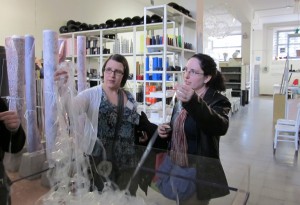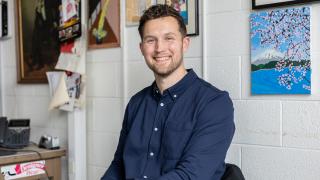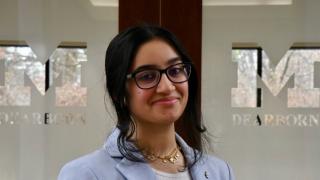 Danielle Camerdiese and Catie Stone explore materials
Danielle Camerdiese and Catie Stone explore materials
ECEC faculty and staff had their own time to reflect during a recent trip to the Italian city of Reggio Emilia, the birthplace of the teaching philosophy the center adopted.
The Reggio Emilia Study Program brought together participants from 12 universities to better understand the Reggio philosophy—which focuses on supporting the rights and ideas of children, families and teachers—and to adapt it to their own learning environments.
“Reggio Emilia isn’t a model that gives you step-by-step instructions on how to educate children,” said Seong Hong, Rosalyn Saltz Collegiate Professor of Education. “We see their programs and think about how they fit into our culture and settings and how we can reinvent them.”
The week included tours of the facilities and classrooms, workshops and discussion groups. Pedagogistas and teachers led presentations about student experiences in the Municipal Infant-toddler Centers and Preschools of Reggio Emilia.
Participants watched as teachers interacted with students, giving children time to create on their own. They listened in as small groups of children worked together on projects. They flipped through children’s notebooks and classroom materials. And a clearer picture of the philosophy—and of the ECEC’s mission—began to develop.
“It’s inspiring to see what it means to respect children’s ideas, to see children as competent individuals,” Hong said.
Thirteen university representatives participated in the program. The group included School of Education (SOE) faculty members, ECEC teachers and an undergraduate SOE student.
Debbie Jones, ECEC site director, said ensuring that a large group of SOE and ECEC faculty and staff could attend was intentional.
“If you want to grow together, everyone has to be involved,” she said. “Everybody has to hear and experience something like this together so that we can move forward with our mission.”
In addition to Hong and Jones, the group included: LaShorage Shaffer, SOE assistant professor; Lauren Stine, SOE senior, majoring in early childhood education; and ECEC teachers Danielle Camardese, Tammy Daigneau, Caryn Finkelstein, Sarah Kurtjian, Kelly Lenihan, Cyndi McAuliffe, Danielle Muehlenbein, Catie Stone and Amy Szymaszek.
Now back in the U.S., participants will take time to further reflect on their experiences abroad as they begin to develop action plans.
“Allowing time for personal and group reflection provides a solid foundation for our work,” McAuliffe said. She plans to work with other ECEC teachers to build on that foundation, trying new methods, evaluating and readjusting.
That process of continual assessment is tantamount to the Reggio Emilia philosophy.
“Reggio Emilia is a lifelong pursuit of translating educational theory into practice,” Hong said. “We have to be intentional about what we do and continue to strengthen the mission of the ECEC.”




